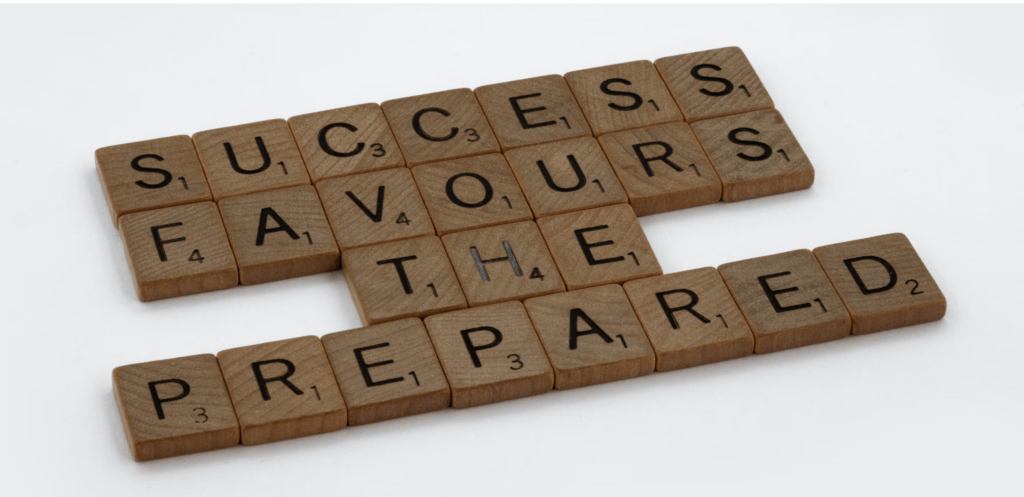How to Set Effective Language Learning Goals!

Setting goals can be hard. Especially language learning goals.
It is so important to set goals though. They give you a vision for the future, help focus you, and keep you on track in life.
Language learning is so valuable and beneficial to your life and although it can be quite the challenge challenge, it is always worth it in the end.
Setting language learning goals can help you in the process. It will help you achieve your language dreams efficiently and effectively!
By the end of this article, you should be able to set some new S.M.A.R.T goals today and put you on the fast track to achieving your language learning dreams!
Why should you set goals?

Goal setting is a powerful process that helps you turn your vision of your future into a reality.
Setting a goal is pointing your feet in the direction you want to move in and giving yourself a roadmap to get there.
You can (and should!) set goals in every aspect of your life. And they should be written down somewhere.
Scientifically, writing your goals down helps commit them to your long-term memory, helps you to be able to physically view and recall your goals, and helps you to better clarify your goals.
The “generation effect” is what helps lock your goals in your long-term memory. This is the phenomenon where the act of writing something down (in your own words) helps your brain remember it much better than if you just read or think about it. Remembering your goals long-term will help you stay on track.
So be sure to write your goals down and take advantage of that generation effect!
There have also been multiple studies that show a stark difference in how people set goals and their subsequent success rates.
One study showed that just by writing your goals down on paper (vs. merely thinking about them), you are 1.4 times more likely to achieve them.
A study by the Dominican University in California showed that just creating a goal and visualizing it can result in a 43% success or partial success rate. However, if you plan out how to achieve that goal, write the goal down, and use a friend as an accountability partner (sending them updates on your progress), that percentage jumps to 76%!
It is quite clear that if you have a goal and want to truly achieve it, writing that goal down and having a game plan will greatly increase your chances of success.
Not only will goal setting help you stay on track to get to where you want to be in life, but it also provides some immediate mental and emotional benefits.
Setting and achieving goals can lead to higher levels of motivation, autonomy, self-esteem, and self-confidence!
For me, at least, there are few greater feelings than checking off a big goal and knowing that all of the hard work I put into it achieved something tangible and good.
What Makes a good Goal?

Now that you know why you should set goals, it is important to know how to set effective goals.
There are lots of different ways to set goals.
You might have already heard of the famous “set S.M.A.R.T goals” adage.
It is indeed a great way to set all of your goals. It is so simple, yet so powerful.
S.M.A.R.T stands for:
S – Specific. A goal should not be too vague or general, but should have a specific end result in mind.
M – Measurable. A goal should not be too abstract. You should be able to measure progress and if it was fully achieved or not.
A – Achievable. A goal should not be too difficult. It should be possible for you to achieve.
R – Relevant. Goals should not be too varied. They should be relevant to the life path you want to stay on and should be focused.
T – Time-bound. A goal should not be open-ended. It should have a deadline.
Ideally, every goal you make (and write down!) should be a S.M.A.R.T goal.

Here is an example goal that is not S.M.A.R.T and how to make it a much more effective goal:
Goal: I want to read more.
Is this specific?
Not really. It does refer to reading, but it does not have any specific reason or type of reading. A quick fix would be to make clear if you want to read novels, comics, etc., or if you want to read self-help books to improve your life, cook books to improve your cooking skills, etc. A better goal would be:
I want to read self-help books.
Next: is this measurable?
No. Right now, there is no way to measure when this goal is finished. What is “more”? Adding a specific number of books is important here. Other possibilities would be all self-help books from one author, all self-help books in a specific list you read online, etc. Anything that you can measurably progress through and achieve works! For example:
I want to read 6 self-help books.
Now, is this achievable?
I personally like to visit this question once I am done with the all the steps. Right now, this goal is still too vague and incomplete. For example, what about the time constraint that will come from T? This will heavily determine if this goal is achievable or not. So for this goal and the letter A, we will come back to it in a second!
Next: is this goal relevant?
This depends on your lifestyle. Is it in line with your life plan? Do you have the time to to dedicate to reading 12 self-help books in a certain time period (work on this in conjunction with T as well) or is your time better spent doing something else?
If this goal is in line with your vision, then you can move onto the next step! If not, you can either narrow in on a specific genre (for example X number of self-help books about self-esteem or about nutrition or forgiveness, etc.) or you can make a new goal that is more in line.
For this example, we will narrow the genre a bit more:
I want to read 6 self-help books related to goal setting and achieving.
Is this goal time-bound?
Not yet. To do this, add a deadline. This goes hand-in-hand with the letter A. If, for example, your goal is to read 6 books in just one month and you work full-time, it will be time-bound, yes, but it will probably not be achievable. It is important to make a realistic deadline here to fulfill the letters T and A! For this goal, we will go with:
I want to read 6 self-help books related to goal setting and achieving within 12 months.
Lastly, check the goal once more.
This one is specific, measurable, achievable, relevant, and time-bound, so it is good to go!
Write it down, keep it (or hang it up) somewhere you will see often and start working on it 🙂
Important to note:
Making sub-goals or complimentary goals is a great plan as well.
For example, a complimentary or sub-goal to the above could be staying on track by reading at least 1 book every two months. Or, keeping a notebook filled with tips from those books or, after reading a book or two, perhaps you now have a new tool to use in goal setting. Maybe one complimentary goal is now to employ that tool and make some new goals (or update your current goals)!
It is a great idea to build off of your goals and expand them. The more inter-connected your goals are, the more motivated you will be to complete one (which might lead to completion of another, etc).
It is like a domino effect of dopamine when you can work on and check off multiple goals at once!
It also keeps you very focused on your goals when so many lead back to the same core goal, which helps lead to a higher chance of success!
What makes a good Language Learning Goal?

Just as with general goals, there are a lot of different ways you can set language learning goals.
As with general goals, I believe setting S.M.A.R.T goals is best.
Here are some examples of not-so-great language learning goals vs. some S.M.A.R.T alternatives!
-> I want to be fluent in German.
A better alternative option: I will pass the TestDaF with all 5’s within 12 months.
Complimentary or sub-goals goals could be: I will finish my TestDaF preparatory textbook within 8 months. // I will complete one timed practice test every month. // I will meet with Matthias to speak German for 30 minutes on Monday, Wednesday, and Friday every week until my exam.
-> I want to study more Korean this month.
A better alternative option: I will to spend 1 hour every Monday and Friday this this month studying Korean with a language tutor on italki.
Complimentary or sub-goals could be: I will spend 30+ minutes reviewing the
Most importantly: Keep language learning goals specific!
This is the biggest pitfall.
Language learning can be extremely abstract and vague.
For example, what exactly is fluency? How do you measurably define if you are fluent or not?
What if you didn’t get much sleep last night and your words are all jumbled and slow today in your target language? Are you any less “fluent”, in the general sense of the word and your overall level, than yesterday, when you were speaking rapid-fire, on a high after your
How do you make language learning goals when the whole process and idea of fluency is so abstract?
You have to make goals based around concrete ideas.
Saying you want to be fluent in German, like the example above, is too abstract. You need to find something concrete and mold your goal around that.
Studying for the TestDaF, for example, will help you progress in reading, writing, listening, and speaking. This will surely help you in becoming “fluent”, but it is something concrete and measurable.
It is very important to pick language learning goals where you can measure yourself. You will only become frustrated if you feel you have not achieved anything, all because you have no real way to measure your success.
Pick a way to achieve your general language learning goals that works with your lifestyle and that you can make concrete, and you will surely reach “fluency” one day! 🙂
Goal Setting Tips and Tricks:
Motivate yourself often!

It is very important to note that dedication and hard work trumps motivation any day.
Some days, you will not be motivated and no amount of motivational talks, quotes, books, etc, will help. You need to rely on your dedication to your goals on these days.
However, many days, you can make your study session better by starting it off with some encouragement.
I find that without motivation, a task can sometimes feel like only work and no play. This is occasionally fine, but I like to motivate myself to go into a task with joy and excitement.
Here are some great and easy ways to motivate yourself ASAP:
– Pinterest – I have a “study tips” board and (shown above) a “language learning motivation” board and I consult both very often before I study. It gives me a bit of a kick to get a really good study session in. You can check out my boards here! Pinterest is a great place for tips of all sorts, beautiful and inspiring quotes and images, videos of inspiration, fun infographics, and more.
– TedTalks – these are amazing to boost your motivation and also dedication to work hard. There are short and long videos, so you are sure to find a talk that fits into your schedule, anytime!
– Books – check the section below for some specific book recommendations! I am an avid reader and I find self-help books give me a ‘motivation high’ for a good chunk of time, every time I read one. Below on this post are some great ones about goals, in particular!
– YouTube – check out this post for YouTubers that can help encourage you in learning languages. From proper polyglots to passionate students to lifestyle YouTubers in your target language, there is a lot of good advice and motivation in regards to language learning goals on YouTube.
– Set up your desk area – add inspiring quotes (print them or handwrite them!), slap some imagery of your goals on the wall, track your progress in a place you look at often, etc. Make your desk space an inspiring place to sit at. Then, every time you sit at your desk, look at everything and remember why you are doing this. This also helps dedicate you to your goals and help you on days where motivation and joy or excitement are lacking.
Keep yourself accountable
As mentioned way up top, in the Dominican University study, the group that not only told a friend about their goals, but gave that friend updates, had a much higher success rate. A whopping 76%!
It is so important that you not only visualize, speak, and write down your goals, but that you also share them with an accountability partner.
Tell them to check in on you every once in a while and then give them regular updates.
You can find a friend who also has some language goals and you can help each other succeed!
If you don’t have a partner and believe you cannot find one – no worries! Comment below and we will help keep you accountable! Or just use yourself and your phone. Schedule weekly reminders on your phone or computer to check in with yourself and see what progress you have made.
However you do it though, it is important to have some outside force helping you along.
Some days we just don’t have enough inside of us to keep pushing. It is always fine to take a break, but just make sure you don’t get caught in a long-term slump.
Rely on language communities (Tumblr or Instagram are two great options!), an accountability partner, or just a friend to help you in these times.
Take it one step at a time, pull yourself up by your bootstraps, and get back into it! Be sure to always celebrate the small wins with your accountability partner. Even studying for a few minutes helps you get that much closer to achieving your dreams 🙂
Keep a goal journal or make your own!

– Legend Planner: Deluxe Weekly & Monthly Life Planner – a great planner that packs a lot in. It has a gorgeous cover in many shades, lots of stickers, and a great design overall. This journal includes pages on self-discovery and vision, dreams and life goals, yearly goals, monthly goals + action steps, strategy and daily rituals, monthly overviews and reflections, and weekly tracking. It is definitely a deluxe planner!
– The 100-Day Goal Journal: Accomplish What Matters to You – very cool journal dedicated to helping you focus on one goal. It has tons of helpful content like reflections, action plans, prompt questions, spaces to write what you are grateful for, etc. If you want to really work hard on one goal for 100 days, this journal will definitely help you achieve that goal!! It packs a lot of help into a small book!
– This Year I Will…: A 52-Week Guided Journal to Achieve Your Goals – great reflection journal to help you realize your goals, fully plan them out, and then track them! This journal is filled with lots of questions and prompts to help you achieve what you set out to do in an effective and positive way.
– Pursuit Goal Journal – a very thorough 6 month journal to help you pursue your goals! You can write down your goals (i.e pursuits) and break them down into monthly and weekly tasks. They’ve got pages for brainstorming, planning, reflection, and more. The only downside is this planner uses a lot of … interesting fonts. *coughPapyruscough*
– Wyze 6 Month Daily Planner – great monthly, weekly, and daily journal. It has pages for goal planning and tracking, morning and night routine planning, and monthly habit tracking as well!
– Clever Fox 1 Year Planner – packed with lots of goodies! Monthly and weekly planning pages, goal realization and planning pages, gratitude pages, and even vision board pages! I find the vision board pages to be particularly interesting, as this is a great place to paste inspiring quotes, images, and mementos to keep you motivated and dedicated. It’s got planner stickers as well!
– The Morning Sidekick Journal: A Habit Tracker Journal – this journal is geared towards making your day (and specifically, morning) as productive as possible. It is highly reflective and helps you to become the best you possible, so that you can achieve your dreams!
– Goal Crazy Undated Planner: A 90 Day Guided Journal – a reflective journal with plenty of space to track and work on goals in all aspects of your life. This journal has daily pages with morning prep and evening reflection, as well as monthly and weekly overview pages.
– The Power Place 6 Months 24 Hour Planner Agenda – if you are looking for a more simple journal to still track your schedule and goals fully, this is the one for you! It has 24 hour planning so you can make it more complex if you want, though the layout is quite minimalist in style.
– Scribbles That Matter Bullet Dotted Journal – 160gsm – make your own goal and habit tracking journal (or a proper bullet journal) with this journal! I have tried hundreds of journals and STM is my all-time favorite as the pages are nice and thick. You can use anything on them and it wont bleed through! I have a few that I use for university studies, language studies, and general life organization. Just grab your favorite pens and some mildliners and you are good to create a custom journal!
Read some encouraging books!
These books below are all amazing books about goal setting and achieving (and habits) that will help you succeed in life. Reading one is sure to give you a huge boost in motivation and dedication, as well as some great tips and ticks!
– Goals: How to Get the Most out of Your Life by Zig Ziglar
– Goals!: How to Get Everything You Want – Faster Than You Ever Thought Possible by Brian Tracy
– Your Best Year Ever: A 5-Step Plan for Achieving Your Most Important Goals by Michael Hyatt
– The Miracle Equation: The Two Decisions That Move Your Biggest Goals from Possible, to Probable, to Inevitable by Hal Elrod
– Dream Big: Know What You Want, Why You Want It, and What You’re Going to Do About It by Bob Goff
– Atomic Habits: An Easy & Proven Way to Build Good Habits & Break Bad Ones by James Clear (not exactly about achieving goals, but a life changing book on building habits, which can then be used to facilitate reaching your goals and dreams!)
What are your current language learning goals? Let me know in the comments below and we can all help keep each other accountable!
Don’t forget to check out my language learning printables on the website shop here, as well! 🙂
From study packs and charts to goal creation to vocab help to weekly language planners and so much more!
These printables will help any language learner - no matter the level or language!
Latest posts:
- The 20 Best Products on Amazon for Spanish Learners!
- 50 Amazing Reasons to Learn a Language Now!
- The 20 Best Products on Amazon for Korean Learners!
- Why You NEED A Kindle for Language Learning! [Tips + Tricks]
- 50 Amazing Quotes About Language Learning [With Phone Wallpapers!]
Let’s be friends! 🙂








![Why you need to be reading in your target language now! [5 benefits + tips]](https://plurilingualism.com/wp-content/uploads/2022/09/ReadingInYourTargetLanguage-768x1047.jpg)